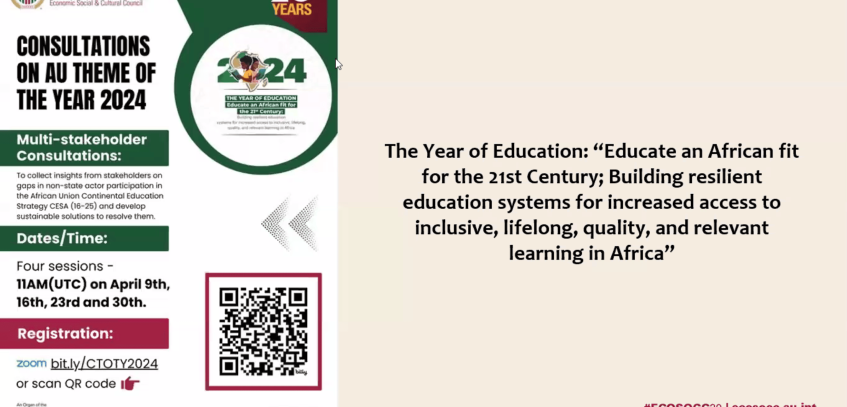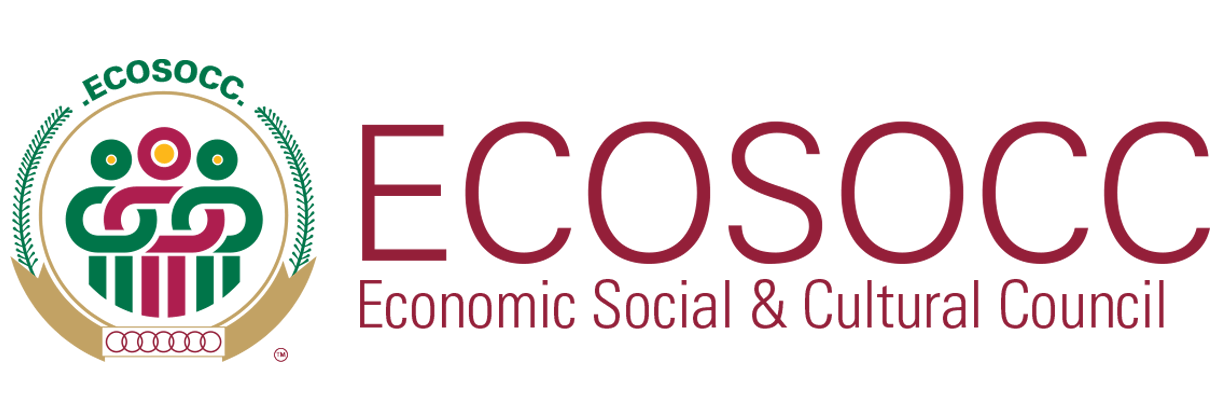The African Union's Economic, Social and Cultural Council (AU-ECOSOCC) successfully launched the first in a series of consultations focusing on the African Union (AU) Theme of the Year for 2024, which is centered around Education. The inaugural session, held virtually on 9th April 2024, convened various stakeholders, including civil society organizations (CSOs), education experts, and policy makers, to deliberate on strategies and recommendations for enhancing educational systems across the continent.
ECOSOCC, as the civil society advisory organ of the AU, has as its core mandate to popularize AU policies and programs. As now an institutional practice, ECOSOCC conducts annual consultations with civil society to reflect over the AU Theme of the Year (AU-TOTY).
Mr. Kyeretwie Osei, the Head of Programs at ECOSOCC, opened the session by outlining the goals of the Theme of the Year 2024 Consultations. He emphasized the significance of these consultations in gathering feedback and inputs for a comprehensive Policy Document that reflects the priorities and aspirations of African citizens in the field of education.
Esteemed speakers underscored the importance of collaborative efforts in addressing educational challenges and the successful implementation of the African Union Continental Education Strategy for Africa (CESA 16-25).
"We all need to collaborate with development partners in order to successfully implement the Theme of the Year," remarked Mr. Mahamat Haroun Adoum, Chair of the Human Resources, Science and Technology (HRST) Cluster Committee of ECOSOCC.
"Education is important in the personal development of all humans, and so let us be committed to efforts that ensure a successful implementation of the Theme of the Year," he said.
Dr. Caseley Olabode Stephens, Policy Officer at the African Union Commission's Department of Education, set the stage for the discussions by presenting an overview of the CESA 16-25. He provided insights into the current state of education across the continent and the strategic objectives of the AU in reforming education systems.
Mr. John Mbuthi, an Education Research Consultant, called for a shift from competitive learning models towards more collaborative and inclusive approaches. He underlined the necessity for quality education that fosters lifelong learning, innovation, and economic empowerment.
Throughout the session, speakers highlighted the need for incorporating peace and security frameworks into education systems across the continent.
"We must ensure that the youth, our future leaders, understand the principles of good governance and democracy," emphasized Mr. Louis Sissoko, Chair of the Political Affairs Cluster Committee of ECOSOCC.
Mr. Louis Sissoko advocated for the incorporation of the African Charter on Democracy, Elections, and Governance (ACDEG) into school curricula. He argued that educating the youth on the principles of good governance and transparent elections is essential for nurturing committed and informed future leaders.
Dr. Jonathan Sandy, Chair of the Peace and Security Cluster Committee at ECOSOCC, linked education with peace and security, presenting peace education as a vital tool for conflict prevention and resolution. He noted the adverse effects of conflict on educational access and infrastructure, calling for concerted efforts to protect and promote education in conflict-affected areas.
Mr. William Carew, Head of the ECOSOCC Secretariat, concluded the session by highlighting the critical role of civil society organizations in shaping the education agenda. He encouraged ongoing participation in the consultation series, underscoring the potential of collective action to influence policy and make a lasting impact on education across Africa.
The consultations will continue with three additional sessions scheduled for 16th, 23rd and 30th April. CSOs are encouraged to join these discussions and contribute to the development of policies that will promote inclusive, lifelong, quality, and relevant learning for all Africans.








